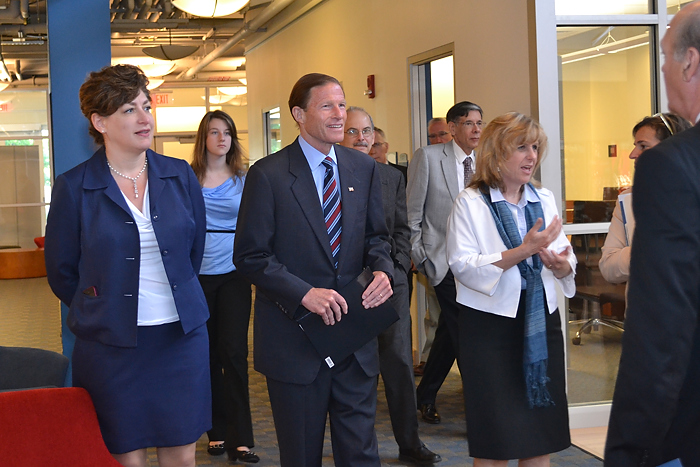U.S. Sen. Richard Blumenthal paid a visit to the UConn Health Center Thursday to learn more about Bioscience Connecticut and how it will impact the University and the state’s economy.
UConn President Susan Herbst, Executive Vice President of Health Affairs and Dean of the UConn School of Medicine Dr. Frank Torti, and Vice President and Strategy Officer for Bioscience Connecticut Thomas Callahan were among those who met with Blumenthal.
Bioscience Connecticut aims to bolster the biomedical industry across the state and help spur innovation and job growth. Jackson Laboratory for Genomic Medicine is the first product of this initiative and will work closely with UConn to help make it a key player in the field of individualized medicine.
Senior Associate Dean for Research and Planning Marc Lalande and the Center for Cell Analysis and Modeling (CCAM) Director Leslie Loew gave Blumenthal a tour of the Cell and Genome Sciences (CGS) building. CGS houses the UConn Stem Cell Institute and CCAM which is developing new approaches to determine how cells work, interact, and respond – and how to organize this data so it can be applied to human health.
Blumenthal concluded his tour of the CGS building with the Technology Incubation Program where several startup biotechnology companies are leasing space. The director of the Office of Technology Commercialization, Rita Zangari, introduced Blumenthal to the owners/researchers of Synbody Biotechnology, Inc.
Synbody is a prime example of what Bioscience Connecticut is all about. Paul Hallenbeck, the president and CEO of Synbody, told Blumenthal the company was lured to the state by the biotech-friendly atmosphere and a seed grant from Connecticut Innovations, the state’s quasi-public authority responsible for technology-based innovation and economic development. Synbody relocated to Farmington from the Philadelphia area earlier this year.
According to the company’s website, it was “established to advance a novel drug discovery platform that utilizes unstructured, synthetically produced peptides to generate ‘Synbodies’ (synthetic antibodies). The patent-pending Synbody technology has a broad range of potential therapeutic application areas including oncology, cardiovascular, central nervous system, diabetes and infectious disease.”
Hallenbeck told Blumenthal they are excited to be in Connecticut and are looking forward to working closely with other scientists and researchers within the Connecticut biotechnology community.
Follow the UConn Health Center on Facebook, Twitter and YouTube.



